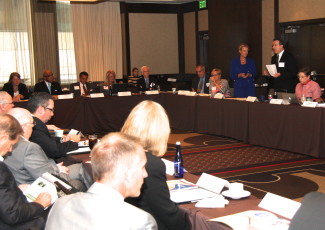K–12 School Moves the Needle on College Readiness
By Sonya Stinson
March 2, 2015
How one Denver high school focuses on student success.
For a high school with a population in which most graduates will be the first in their families to earn a high school diploma, let alone attend college, creating a “college-going culture” is an ambitious goal.
But that’s just what teachers and administrators at Sheridan High School, just south of Denver, set out to do when they began implementing a series of reforms a few years ago. For any doubters, administrators can point to the success they’ve already achieved in boosting graduation rates.
Eighty percent of Sheridan High School students who enrolled in 2010 graduated by 2014, up from an on-time rate of 60 percent in 2013. Only a year earlier, just three of 10 students who had entered either Sheridan or the school district’s alternative high school were graduating within four years. More counseling and intervention are part of the reason for the turnaround. Sheridan also added an extra hour to the school day, which students can use to get help if they fall behind in their studies.
Promoting college readiness
Besides focusing on improving graduation rates, Sheridan has taken several steps to ensure its students are ready for the rigors of college study. All students must complete four years of math with at least a 70 percent average before they can graduate. Students who pass the precollege algebra class with a C or better can automatically enroll in college algebra at nearby Arapahoe Community College. That policy has reduced the need for remedial classes at the college.
Sheridan also allows all of its students to take advanced-placement courses for college credit. Students who don’t pass the courses still benefit from the experience, because “they see how far away they are,” says principal Michele Kelley. “They know where they are performing now and where they need to be performing to be college-ready.”
Sheridan students can take an elective that provides an overview of the academic and social skills required for college success. For the past four years, the high school has been part of College Summit, a program that uses peer leadership to promote college attendance among low-income students. Student participants attend a four-day intensive workshop on a college campus and have access to additional training sessions about college life and learning throughout the year.
“They come back and bring that information to their peers at school,” Kelley says. “It’s really helped us to create a college-going culture.”
Celebrating success
The goal is for every Sheridan student to apply to at least three colleges; students who succeed get public recognition: Whenever someone gets an acceptance letter or declares a major, the news is posted in a school hallway.
With so many first-generation high school completers and college enrollees coming out of Sheridan, educating parents about the college-admissions process is paramount, Kelley says. School officials meet with parents one Saturday each month. When they started the sessions, Kelley asked the parents what they wanted to learn. At first they wanted an explanation of grade-point averages, but before long, parents were asking how they could help their children apply to college, prepare for the ACT and find scholarships. Recently, the school held a financial-aid workshop for parents.
Sheridan will have another great success story to point to when valedictorian Joel Marquez walks across the stage this spring. Along with his high school diploma, Marquez is getting an associate degree in computer science from Arapahoe. With his eye on becoming a computer programmer, he started taking college-credit courses as a sophomore as part of the high school’s concurrent enrollment program.
“He’s a very bright young man and very hard working, so he was able to create his own plan,” Kelley says.
Want more information on developmental education and interventions that could help students on your campus? Check out the latest resources on AACC’s 21st-Century Center.










